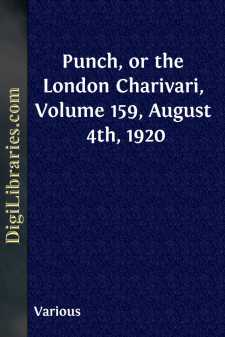Categories
- Antiques & Collectibles 13
- Architecture 36
- Art 48
- Bibles 22
- Biography & Autobiography 813
- Body, Mind & Spirit 142
- Business & Economics 28
- Children's Books 17
- Children's Fiction 14
- Computers 4
- Cooking 94
- Crafts & Hobbies 4
- Drama 346
- Education 46
- Family & Relationships 57
- Fiction 11829
- Games 19
- Gardening 17
- Health & Fitness 34
- History 1377
- House & Home 1
- Humor 147
- Juvenile Fiction 1873
- Juvenile Nonfiction 202
- Language Arts & Disciplines 88
- Law 16
- Literary Collections 686
- Literary Criticism 179
- Mathematics 13
- Medical 41
- Music 40
- Nature 179
- Non-Classifiable 1768
- Performing Arts 7
- Periodicals 1453
- Philosophy 64
- Photography 2
- Poetry 896
- Political Science 203
- Psychology 42
- Reference 154
- Religion 513
- Science 126
- Self-Help 84
- Social Science 81
- Sports & Recreation 34
- Study Aids 3
- Technology & Engineering 59
- Transportation 23
- Travel 463
- True Crime 29
Punch, or the London Charivari, Volume 159, August 4th, 1920
by: Various
Categories:
Description:
Excerpt
SOLVING THE HOLIDAY FARE PROBLEM.
"None but the rich can pay the fare" is as true at this moment as when the words were first penned.
The reference, of course, is to the return fare, for the single fare of tomorrow is hardly more than we paid without complaint in years gone by for the journey there and back.
How comparatively few people seem to be aware that the solution of the difficulty lies in not returning. Could anything be simpler?
Nobody wants to return. In preparing for a holiday our thoughts are concentrated on when to go, where to go and how to get there. Who bothers himself about when to come back, where to come back from, and how to do it? After all, holiday-making is not to be confused with prize-fighting.
That we have come back in the past has been due as much to custom as to anything. Someone introduced the silly fashion of returning from holidays, and we have unthinkingly acquired the habit. Once we shake off this holiday convention the problem of the return fare is solved.
Just stay where you are and all will be well. Sooner or later your friends or your employer (if your return is really considered desirable) will send a money-order. But that is their look-out. The point is that the return fare need not trouble you. And you can please yourself as to what you buy with the money-order.
Why all this outcry then about the cost of travelling in the holiday season?
"M. Lappas, the young Greek tenor whose début last season won him a host of fiends."—Daily Paper.
As Mephistopheles, we presume.
"Lost, Monday, July 19th, silver purse containing 10s. note and photographs; also lady's bathing costume."—Local Paper.
Wrapped up in the "Fisher," no doubt.
I once knew a bowler named Patrick
Who, after performing the "hat-trick,"
Remarked, as he bowed
His respects to the crowd,
"It's nothing: I often do that trick!"
The scene is the morning-room of the Smith-Hybrows' South London residence. It is the day following the final performance of the Smith-Hybrows' strenuous season of J.M. Synge drama, undertaken with the laudable intention of familiarising the suburb with the real Irish temperament and the works of the dramatist in question.
Mrs. Smith-Hybrow is seated at the breakfast-table, her head buried behind the coffee urn. She is opening her letters and "keening" softly as she rocks in her chair.
Mrs. Smith-Hybrow (scanning a letter). Will I be helping them with the sale of work? It's little enough the like of me will be doing for them the way I was treated at the last Bazaar, when Mrs. McGupperty and Mrs. Glyn-Jones were after destroying me with the cutting of the sandwiches. And was I not there for three days, from the rising of the blessed sun to the shining of the blessed stars, cutting and cutting, and never a soul to bear witness to the destroying labour of it, and the two legs of me like to give way with the great weariness (keens)? I'll have no call this year to be giving in to their prayers and beseechings, and I won't care the way the Curate will be after trying to come round me, with his eyes looking at me the way the moon kisses the drops of dew on the hedgerows when the road is white....












